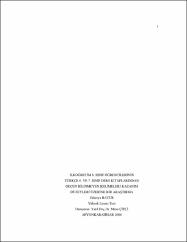İlköğretim 8. Sınıf Öğrencilerinin Türkçe 6. ve 7. Sınıf Ders Kitaplarından Geçen Bilinmeyen Kelimeleri Kazanım Düzeyleri Üzerine Bir Araştırma
Özet
Bu çalışma Uşak Merkezindeki ilköğretim 8. sımfa giden öğrencilerin Türkçe 6. ve 7. sımf ders kitaplarında geçen bilinmeyen kelimeleri kazanıp kazanmadıklarını incelemek amacıyla yapılmıştır. Araştırmada sosyo-ekonomik düzey (SED), (öğrencinin bilgisayar sahibi olması, çalışma odasının olması, gecekondu ya da apartmanda oturması, kira ya da ev sahibi olması gibi faktörler) cinsiyet, anne-baba mesleği ve okuyan kardeş sayısı gibi faktörlerin bilinmeyen kelimelerin kazanımına etkisi incelenmiştir.
Araştırma örneklemi Uşak Merkezde bulunan SEDY1: Halit Ziya Uşaklıgil, SEDY2: Besim Atalay, SEDO1: 23 Nisan, SEDO2: Ömer Bedrettin Uşaklı ve SEDD: Malkoçoğlu İlköğretim Okullarında 6’şar öğrenci olmak üzere üç farklı sosyo¬ekonomik düzeydeki 30 öğrenciden oluşturulmuştur. Bu öğrenciler, sınıf listelerinde 1,
5, 10, 15, 20 ve 25 sıralarındaki öğrencilerden seçilmiştir. Örnekleme alınan öğrencilere, ders kitapları dikkate alınarak araştırmacı tarafından geliştirilen “Çalışma Yaprakları Formu” uygulanmıştır. Çalışma formu 10 başlık altında toplanmıştır.
Çalışma yaprakları bizzat araştırmacının kendisi tarafından uygulanmıştır. Toplanan veriler bilgisayar ortamında SPSS Paket Programı’yla analiz edilmiştir. Yapılan analizler sonucunda cinsiyetin kelime kazanımı üzerinde etkili olmadığı, sosyo¬ekonomik düzey, anne-baba mesleği ve okuyan kardeş sayısının etkili olduğu görülmüştür.
Öğrencilere uygulanan 376 kelimeden 158 kelime 15 ve daha fazla öğrenci tarafından bilinmiştir. 218 kelime ortalamanın altında tanımlanmıştır. Bu bakımdan Türkçe ders kitaplarında geçen bilinmeyen kelimelerin istenilen düzeyde kazanılmadığı görülmüştür. This study aimed to investigate the primary 8th grade students’ level of acquisition of unknown words given in the 6th and 7th grade Turkish course books. Variables such as socio-economic status, possessing a computer, owning a study room at home, living in a shanty house or a flat, renting or owning a house, gender, parents’ professions, and an affect of other siblings in the school from the family to the acquisition of unknown words were taken fort the purposes of this research.
Research sample for this study compose of 30 students currently studying at five schools representing three different socio-economic status; SEDY1: Halit Ziya Uşaklıgil, SEDY2: Besim Atalay, SEDO1: 23 Nisan, SEDO2 : Ömer Bedrettin Uşaklı and SEDD: Malkogoglu Primary Schools. Students representing the sample of this study were selected from the 1st, 5 th, 10th,15th, 20th and 25 th from the class list.
‘Work Sheet Forms’ were developed with consideration of the course books by the researcher and they were applied by the researcher himself to the students composing the study sample. Work Sheet Form were formed under 10 headings. Collected data were then analysed on the computer using SPSS Package.
As for results, it was evident that the gender variable did not affect the acquisition of unknown words whereas variables such as socio-economic status, parents’ professions and an affect of other siblings’ in the school from the family did seem to affect the acquisition of unknown words. 158 words were known by 15 or more students out of 376 words applied to the sample of students. 218 words were described under average. Consequently, we could argue that the unknown words given in the Turkish course books were not acquired to a satisfying level.
Bağlantı
http://hdl.handle.net/11630/2867Koleksiyonlar
- Yüksek Lisans Tezleri [1638]



















